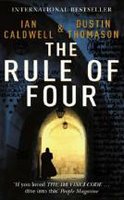The Rule Of Four - by Ian Caldwell & Dustin Thomason
 This is one of those books I picked up in the airport last year but didn't get round to reading until now. I'd already read Dan Brown's The Da Vinci Code and this looked like it could be a similar and enjoyable break from my usual intake of science fiction and fantasy...
This is one of those books I picked up in the airport last year but didn't get round to reading until now. I'd already read Dan Brown's The Da Vinci Code and this looked like it could be a similar and enjoyable break from my usual intake of science fiction and fantasy...
It's Easter at Princeton and the seniors are scrambling to finish their theses. Two students, Tom Sullivan and Paul Harris, are a hair's breadth from solving the mysteries of the Hypnerotomachia Poliphili, a renowned text Italian that has baffled scholars since its publication in 1499. For Tom, their research has been a link to his family's past and an obstacle to the woman he loves. For Paul, it has become an obsession, the very reason for living. But as their deadline looms, research has stalled...until a long-lost diary surfaces with a vital clue. And when a fellow researcher is murdered just hours later, Tom and Paul realize that they are not the first to glimpse the Hypnerotomachia's secrets.
Suddenly the stakes are raised, and as the two friends sift through the codes and riddles at the heart of the text, they are beginning to see the manuscript in a new light—not simply as a story of faith, eroticism and pedantry, but as a bizarre, coded mathematical maze. And as they come closer and closer to deciphering the final puzzle of a book that has shattered careers, friendships and families, they know that their own lives are in mortal danger. Because at least one person has been killed for knowing too much. And they know even more.
Billed as the thinking man's Da Vinci Code, this fails to come up with the goods. The subject of the story, the Hypnerotomachia Poliphili, is in fact a real Renaissance text written in a mix of hybrid languages and scholars agree that it does contain a variety of hidden mysteries. But, while the authors artfully go about solving the deep level of complexity involved in the puzzles held within the Hypnerotomachia's pages, the story itself seems to concentrate heavily on life at Princeton, going into detail that simply alienates us common folk. On top of that we're supposed to believe that these young heroes have a depth of knowledge about history and the classics that would take most people many years to accumulate.
Then there's the pace. While the Da Vinci Code, for all that it's been slated by the critics, is an entertaining and fast-paced murder yarn with lots of tension and drama, this is way too slow. It was almost 200 pages in before someone copped it and then almost another 300 before some real action gets going and then that fizzled out pretty quickly. It goes nowhere and just seems to waffle on and on about Princeton and I suspect the authors would have liked to stay there.
Genre: History, Mystery.
My Rating: 4/10

No comments:
Post a Comment